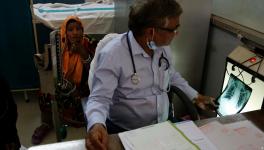How the Human Immune System Evolved to Fight Tuberculosis?
Representational use only. Image Source: Technology Networks
Pandemics have had a history of ravaging human societies, be it the Black Death, the Spanish Flu and now COVID-19. Millions have succumbed to pandemics alongside social and economic losses. However, one disease that still prevails and is endemic to many countries, including India, which results in higher death tolls than pandemics, is Tuberculosis (TB), which has killed over a billion people in over two millennia; it still kills about 1.5 million people a year.
TB is endemic to India, meaning it is widely present even today in the country. However, how TB has remained so lethal was a mystery. A new study on genetic history however sheds new light on this aspect. The study, published in the journal Cell on March 4, also showed how the immune system evolved to fight TB.
The study traced the evolutionary history of 10,000 years of a gene variant which can make people more susceptible to a serious TB attack.
Earliest evidence found in the skeletons from middle east show TB was around 9000 year ago, a period when humans came across agriculture. However, the variant of TB that is prevalent today, namely Mycobacterium tuberculosis, emerged only 2000 years ago. This marks the period when humans started to live in denser settlements with domesticated animals. It is also thought to be the reservoir of TB.
A two-year-old study found that a variant of one of the immune genes (TKY2) puts people at a higher risk of severe illness. The variant is known as the P1104A. This study analysed the frequency of occurrence of the P1104A variant in 1013 European genomes over 10,000 years. The researchers found that the P1104A mutation was an older one which arose around 30,000 years ago.
The mutation was discovered in the DNA of an ancient farmer who lived 8,500 years ago in modern-day Turkey. This variant of the immune gene was spread by people migrating from the region to central Europe. The researchers also studied the change in frequency of the particular variant and could estimate that three per cent of the population had the variant until 5,000 years ago. However, until 3000 years ago ten per cent of Europeans carried the immune gene variant. Later, the frequency of the gene variant came down to about three per cent, which is the same rate of occurrence among today’s Europeans.
Interestingly, the steep decline also coincides with the emergence of the modern variety of TB, Mycobacterium tuberculosis.
Spanish biologist Lluis Quintana Murci, the author of the Cell study, tried to decipher how population dynamics influenced by migration impacted the frequency of occurrence of the gene variant. The research team proposed that TB could inflict a lethal attack on one fifth of those who had two copies of the P1104A variant. While the majority of the carriers of the gene variant died, few could still survive and had their off-springs carrying those variants till 2,000 years ago. The researchers concluded that evolutionary pressure wiped out the lethal gene variant to much lesser numbers.
“Infectious disease are the strongest evolutionary pressure humans have to face,” Murci was quoted saying. “We are the descendants of people who survived past epidemics. This paper helps identify which are the true pathogens that have changed our DNA and made us more resilient,” he reportedly added.
The study enhances our understanding of how deadly pathogens and the human immune system co-evolved. It is also important from the point of view of surveillance. New databases like the UK databank, where genetic details of people of the country are stored, could be searched for prevalence of such gene variants.
Gaspard Kerner, the lead author of the study, explained: “There is an urgent need today to know how widespread the P1104A variant is. It is rare in populations tested in India, Indonesia, China, and parts of Africa where TB is endemic. But about one in 600 British people in the UK Biobank database carries two copies of the variant. They are at high risk of severe illness or death if they are exposed to TB.”
Get the latest reports & analysis with people's perspective on Protests, movements & deep analytical videos, discussions of the current affairs in your Telegram app. Subscribe to NewsClick's Telegram channel & get Real-Time updates on stories, as they get published on our website.
























